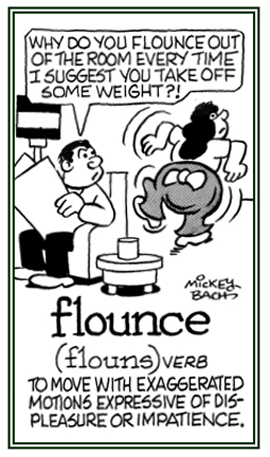You searched for:
“flounce”
1. A fast way of walking or moving which shows anger or annoyance: After Fay's criticisms, Rodney left the room with a flounce.
2. A strip or ruffle of cloth which is attached to a piece of clothing by one edge: Alisa's dress had so many flounces that she kept getting them caught on things.
2. A strip or ruffle of cloth which is attached to a piece of clothing by one edge: Alisa's dress had so many flounces that she kept getting them caught on things.
Dena's gown had several flounces with tiers or rows of pink lace.
3. Etymology: this sense of flounce, referring to "a strip, a pleat" or "ruffle of fabric attached on one edge", did not appear in English until the 18th century; despite the fact that flounce came from the Middle English frouncen, "to curl" in the 14th century.
This entry is located in the following unit:
English Words in Action, Group F
(page 4)
flounce (verb), flounces; flounced, flouncing
1. To walk with an exaggerated purpose, to storm out: The actress was so angry that she turned and flounced off the stage.
3. Etymology: the information regarding "flounce" is mixed up and uncertain.

© ALL rights are reserved.
Go to this Word A Day Revisited Index
Fred's wife flounced around the house in a huff, yanking doors open and slamming them shut as she stomped from room to room.
2. To go with sudden determination or to move with exaggerated motions: The main dancer flounced off the stage with the other dancers who were flouncing off behind her in perfect unison.3. Etymology: the information regarding "flounce" is mixed up and uncertain.
The verb's first recorded use in English took place in 1542, and some linguists say it is related to the Norwegian verb flunsa, "to hurry" or "to work briskly"; and Swedish flunsa, "to fall with a splash" or "to plunge".
Such relationships can not be verified because these flunsa verbs didn't appear in those languages until the 18th century, long after flounce was already used in English.

Go to this Word A Day Revisited Index
so you can see more of Mickey Bach's cartoons.
This entry is located in the following unit:
English Words in Action, Group F
(page 4)
